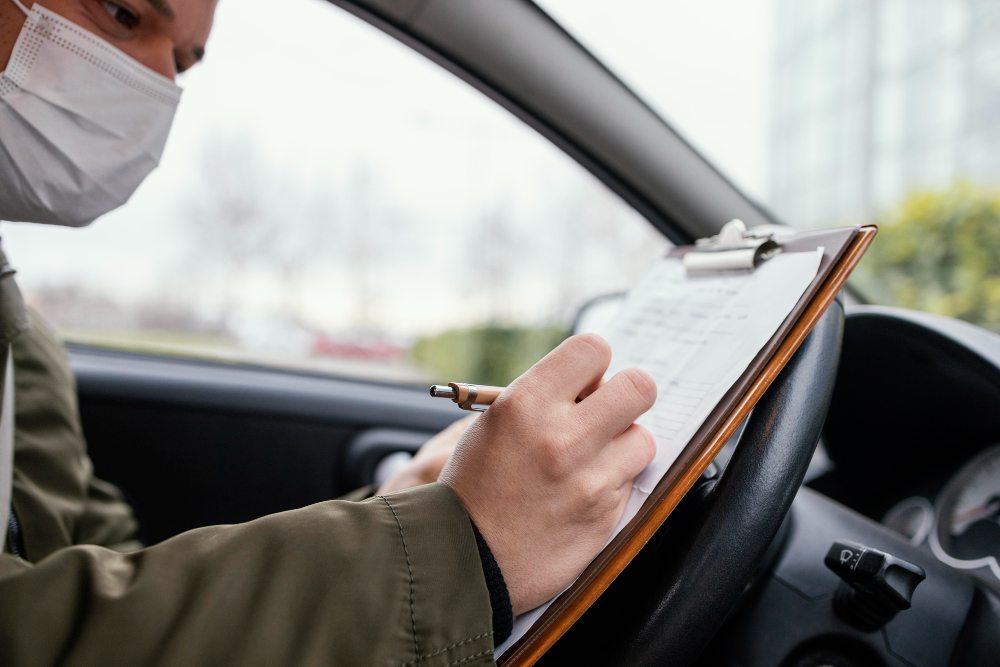How Many Driving Lessons Are Needed to Pass Your Test?
Several factors influence the number of driving lessons required to pass your driving test. Many learners aim to minimise lessons to cut costs, but it’s crucial to view driving lessons as a worthwhile investment.
Adequate lessons not only reduce the risk of failing and needing to retake the test but also ensure you become a safer, more competent driver. So, let’s find out how many lessons you should aim for to pass your test successfully.
Required Lessons to Pass a Driving Test
On average, acquiring driving skills typically involves about 45 hours of formal lessons, according to the Driver and Vehicle Standards Agency (DVSA). In addition, learners often spend around 22 hours practising independently. However, these figures are just averages; some individuals may require fewer lessons, while others might need more.
What’s crucial isn’t the exact number of lessons you take but ensuring you become a competent and safe driver. The statistics on new drivers and road accidents underscore the critical need for thorough preparation and responsible driving habits to ensure road safety.

Key Factors Influencing the Number of Driving Lessons Needed
Several factors play a role in determining the number of driving lessons required to pass your driving test:
Age: Generally, younger learners tend to acquire driving skills more quickly, potentially requiring fewer lessons.
Lesson Frequency: The regularity of your driving lessons impacts your overall progress. More frequent lessons usually lead to faster learning.
Private Practice: The amount of additional practice you get outside of formal lessons can significantly affect how many lessons you need. More private practice can reduce the number of professional lessons required.
Budget: Your financial situation affects how often you can afford to take lessons and which driving instructor you can choose. Both of these factors are crucial for your learning process.
Instructor Quality: The skill and experience of your driving instructor can influence how effectively you learn. An experienced instructor might help you progress faster.
Learning Style: How you absorb and apply new information also matters. Different learning styles may require different approaches, impacting the number of lessons needed.
Each of these elements contributes to how quickly you can become a competent driver and how many lessons will be necessary for you to pass your test.

Reasons You Might Need More Time to Pass Your Driving Test
Several factors could extend the time it takes for you to pass your driving test. Remember, everyone learns at their own pace, so if your journey takes a bit longer, it’s perfectly okay. Here are some reasons why you might require additional lessons:
Lack of Familiarity with the Highway Code
Your grasp of road regulations, signs, and general road knowledge plays a significant role in your ability to drive safely and pass your theory test. Ensuring you’re well-versed in the Highway Code before your practical test can potentially reduce the number of lessons needed.
Nervousness Behind the Wheel
Feeling anxious or lacking confidence while driving can significantly impact your learning process. If you find yourself feeling nervous, you might need more lessons to build the comfort and assurance needed to drive confidently.
Extended Waiting Times for Driving Tests
Currently, driving test appointments may have long waiting periods, sometimes stretching up to six months. This delay, which is beyond your control, could necessitate additional practice to keep your skills sharp. More lessons during this waiting period might not only help maintain your driving proficiency but also increase your chances of passing the test when the time comes.

Essential Steps to Minimise Your Driving Lessons
Maintain Regular Lessons
Consistency is key. Aim for weekly, two-hour driving lessons. Shorter, one-hour sessions can waste time on recaps and transitions, reducing your overall value.
Prepare Mentally
Approach each lesson with a clear, focused mindset. Reflect on your previous lessons and avoid late nights before driving sessions to ensure you’re alert and engaged.
Recap Each Lesson
Start every lesson with a review of your last session. A good instructor will discuss what you achieved, what needs improvement, and set goals for the current lesson.
Set Clear Objectives
Each lesson should have a specific goal. Without a clear objective, your progress can stall. Ensure you know what you covered previously and how it ties into your current lesson.
Follow a Structured Approach
Lessons should be systematic, beginning with basic skills and advancing in complexity. Your instructor should assess your understanding frequently, moving from guided practice to independent driving.
Review and Reflect
At the end of each lesson, summarise what you’ve learned. Discuss whether the objectives were met and identify areas needing more practice. This helps reinforce your knowledge and prepares you for the next lesson.
Self-Evaluate and Build Confidence
Reflect on your driving performance. Consistent practice enhances confidence and reduces test anxiety. Avoid last-minute preparations; being well-prepared leads to better test results.
Heed Instructor Advice
Listen to your driving instructor’s feedback. They have the expertise to gauge your readiness for the test. Trust their guidance on whether you’re prepared and follow their recommendations to improve.
By following these steps, you can optimise your driving lessons and increase your chances of passing your test on the first try.
Table of Contents

